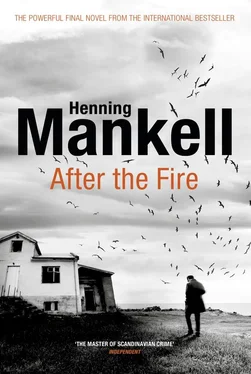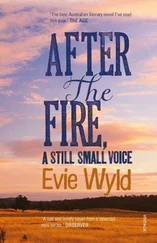This exercise was repeated at regular intervals. After a while everyone in Alingsås knew about the strange pantomime played out early in the mornings during the warmer months. Curious onlookers hid behind bushes and in the undergrowth, gleefully watching as the naked matron ploughed through the water before complaining as the leeches fastened themselves to her flesh.
This was Adolf Sundberg’s story. Everyone believed it deep down but felt obliged to express their doubts with regard to its veracity. You couldn’t just send a naked old woman into a fish pond, using her body as bait to catch leeches. It wasn’t possible. Admittedly some men mistreated their wives, but this was beyond the bounds of decency.
I spent a long time gazing at the picture of Adolf Sundberg with his cup of coffee. From far away I heard the voices coming back to me: my grandfather’s slow, almost hesitant way of formulating a sentence, my grandmother, who didn’t say much but spoke with the utmost precision, using beautiful similes taken from a seemingly inexhaustible store. And then Adolf Sundberg, with his domed hat, his bushy beard and his shiny waistcoat; over the years the stains and grease marks had combined to form a patina that was never washed away.
They would always sit there on those white chairs, even though they were all dead and the chairs had been lost in the devastation of the fire.
The last black and white photograph had been taken on my grandfather’s seventy-fifth birthday, 19 June 1957. The photographer, Tage Palmblad, had gathered a large group of people around the porch and the garden furniture, with my grandfather right at the front, my grandmother by his side. When I studied the picture more closely I discovered to my surprise that I was there too, squeezed in between two of my grandmother’s cousins, who were considerably more interested in how they appeared than in giving me enough room.
I was thirteen years old when that picture was taken: my hair bleached chalk-white by the sun, short trousers, a striped top, sandals, skinny body, unsure of myself in front of all those people.
I thought I would invite everyone I had got to know in the archipelago to a house-warming party when my new home had risen from the ruins. I would sit right at the front, with Louise and her family beside me.
I called Wiman to thank him for his speedy response to my request.
‘There might be more pictures,’ he said. ‘But as I explained, the archive is in a real mess, and I haven’t had time to sort it out yet.’
‘These are fine — more than enough for those who are going to build my new house.’
‘Did you know that the Österströms’ place on Skarsholmen was built at the same time?’ Wiman said. ‘If I’ve understood correctly, they used the same builder.’
So whoever I chose could use the Österströms’ house as a detailed model.
‘It hadn’t occurred to me, but of course that’s very important because there are no drawings. In the old days the master builders and their clients were their own architects.’
After the conversation with Wiman I went up to my grandfather’s bench with my binoculars so that I could check on my tent, but there wasn’t a soul in sight.
Twilight was beginning to fall. I shivered. I had almost reached the caravan when I heard my phone ringing on the table. I stumbled on a root and banged my chin on the edge of the caravan. When I reached up to check the damage, my hand came away covered in blood. I staggered inside and grabbed my phone as it stopped ringing. I wiped my bloody face with a tea towel; I could feel with the tip of my tongue that I had lost a tooth from my lower jaw. I picked up the torch and went back outside to see if I could find it in the grass.
I couldn’t find the tooth. Had I swallowed it without noticing? I went back inside, put some ice cubes in a plastic bag and held it against my lips. It took a long time for the bleeding to stop. I looked at my mouth in the shaving mirror; the tooth had broken off cleanly, and the root was lost in congealed blood. When I pressed the gum with my finger, I felt a sharp, stabbing pain. I would have to go and see the dentist tomorrow; it was too late now. I could probably find an emergency dentist in town, but I didn’t want to set off at this hour.
I took some strong painkillers then checked to see who had called. It was Louise. I rang her back, but the number was busy. I tried again; still busy. I lay down on the bed clutching my mobile. The thought of having to spend time going to the dentist annoyed me. Or perhaps I was just tired. Growing older meant losing a little bit of energy every single day. And one day it would be completely gone.
I dropped off to sleep, only to be woken by Louise on the phone. I didn’t ask how she was, or Agnes, or the family; I simply launched into an account of my bleeding mouth and my broken tooth. However, she interrupted me.
‘Agnes is sick.’
Her voice was almost breaking. I sat up straight and clamped my jaws together, which was a painful mistake.
‘What’s wrong with her?’
‘They don’t know.’
‘What are her symptoms?’
‘She screams all the time. She’s in pain.’
‘In her tummy?’
‘Her head.’
‘Her head?’
‘Oh God, I don’t know. No one knows.’
Her fear became mine. I had no doubt that whatever was wrong, Louise’s reaction was definitely not unwarranted. I racked my brains for an answer. I had never specialised in paediatrics, nor had I been involved in anything other than routine surgical procedures on children. The fact that it was something to do with the head was worrying. A baby’s heart and brain are fragile.
I tried to calm both Louise and myself. I asked her to tell me what had happened; could she tell me any more about Agnes’s symptoms? What exactly had the doctors said?
Apparently the whole thing had been very fast. That morning Agnes had suddenly started screaming. Nothing had helped, not even an attempt at breastfeeding. Louise had taken her to the hospital while Ahmed stayed at home with Muhammed. In the children’s emergency unit they had immediately admitted her for observation and tests. Louise was calling from the hospital; I wrote down the name on the back of a packet of crispbread.
Her explanation didn’t enable me to reach any conclusion about what might be wrong with the child. It was very unusual, but not unknown, for babies to suffer a brain haemorrhage. On the other hand encephalitis, or inflammation of the brain, sometimes affected small children and could be life-threatening. Nor could a tumour be ruled out. The French doctors were trying to establish a definite diagnosis at this very moment.
I asked if Agnes had a temperature. She didn’t, but the pain in her head was still there. Louise was waiting for her to undergo a brain scan.
I asked if she wanted me to come. She said no, but I could tell from her voice that she could easily change her mind.
She didn’t want to stay on the phone because she was waiting for Ahmed to call. She promised to let me know as soon as she had any news.
‘If nothing happens, call me anyway,’ I said. ‘I’ll keep the phone with me all the time, and it’s fully charged.’
Clutching the phone as tightly as if it were a rosary, it seemed to me that death was suddenly present in the caravan. I didn’t want him here. I called Lisa. I didn’t ask where she was or if I was disturbing her, I simply told her what had happened.
‘That sounds terrible,’ she said. ‘Do you want to come over?’
‘No, but thank you for asking.’
‘Are you really going to sit there in the caravan all by yourself?’
I didn’t reply. More than anything I wanted to stagger down to the boat, hope the engine started and head for the mainland.
Читать дальше












